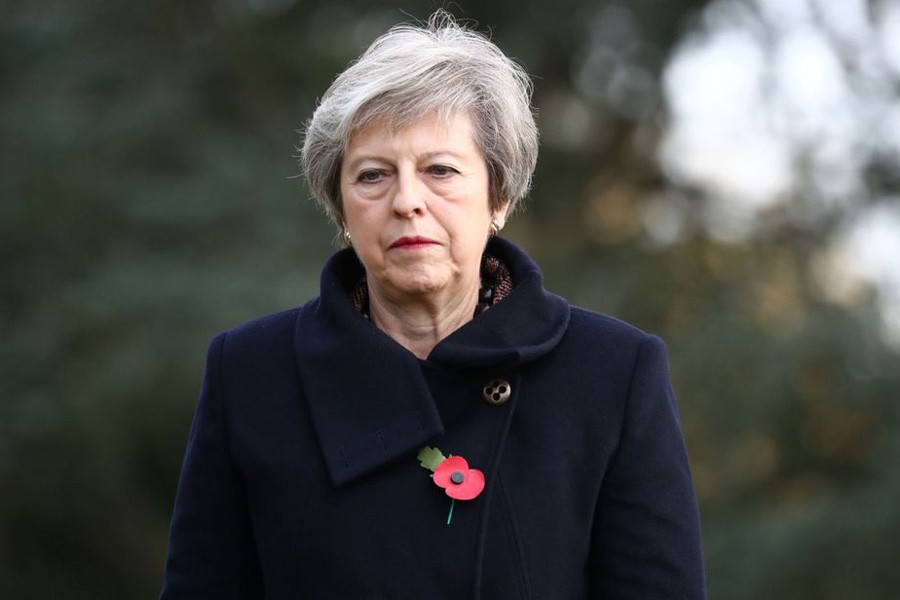UK Prime Minister Theresa May battled on Thursday to save a draft divorce deal with the European Union after her Brexit secretary and other ministers quit in protest at an agreement they say will trap Britain in the bloc’s orbit for years.
Just over 12 hours after May announced that her team of top ministers had agreed to the terms of the draft agreement, Brexit minister Dominic Raab and work and pensions minister Esther McVey quit, saying they could not support it.
Their departure, and the resignations of two junior ministers, shakes May’s divided government and her Brexit strategy, raising the prospect of Britain leaving the EU without a deal. Some lawmakers in London openly questioned whether May’s government will survive, reports Reuters.
Raab is the second Brexit secretary to quit over May’s plans to leave the EU, the biggest shift in British policy in more than 40 years. By leaving now, some suggested that Raab could be positioning himself as a possible successor to May.
But the prime minister showed little sign of backing down in parliament, where she warned lawmakers they now faced a stark decision.
“The choice is clear. We can choose to leave with no deal, we can risk no Brexit at all, or we can choose to unite and support the best deal that can be negotiated,” she said.
She acknowledged that hammering out an agreement with her cabinet was not “a comfortable process” but said those lawmakers who believed she could get a deal that did not include a backstop arrangement to prevent the return of a hard border on the island of Ireland were wrong.
Sterling plunged, set for its second biggest drop this year on the opposition to the draft agreement.
British financial regulators held a call with major banks asking for feedback on market conditions after the pound and financial stocks sank, sources said. One source said the call was a direct request from Bank of England Governor Mark Carney. The Bank of England declined to comment.
STRATEGY IN DOUBT
In parliament, lawmakers from her Conservative Party and the opposition parties took turns to rubbish the draft deal, a sign May faces an all but impossible task to get the agreement through the House of Commons.
Many criticised the draft deal, agreed with the EU on Tuesday, for making Britain a “vassal” state, beholden to the bloc’s rules even after leaving in March next year.
Others said an agreement on the so-called backstop would tear Britain apart, leaving Northern Ireland all but in the EU’s single market.
It took an hour of parliamentary questions before she was asked a friendly, rather than hostile, one, with a Conservative lawmaker saying May had done the best she could.
It was the backstop arrangement, which would see Britain and the EU establishing a single customs territory, that spurred most of the criticism and the resignations of her senior ministers.
“I cannot reconcile the terms of the proposed deal with the promises we made to the country in our manifesto at the last election,” Raab said.
Less than five months until Britain leaves the EU on March 29, the resignations put May’s Brexit strategy in doubt.
EU leaders are ready to meet on Nov. 25 to sign off on the divorce deal, or Withdrawal Agreement, but French Prime Minister Edouard Philippe summed up the uncertainty when he said events in London raised concerns about whether it would be ratified.
“We need to prepare ourselves for a no-deal Brexit,” he said.
One eurosceptic lawmaker in May’s Conservative Party said more colleagues were either putting in letters to trigger a no confidence vote in her leadership or were increasingly minded to do so. A challenge is triggered if 48 Conservatives write such letters. May could be toppled if 158 of her 315 lawmakers vote against her.
‘DEAD IN THE WATER’
Britain’s opposition Labour Party said the government was “falling apart”.
“Theresa May has no authority left and is clearly incapable of delivering a Brexit deal that commands even the support of her cabinet, let alone parliament and the people of our country,” said Jon Trickett, a member of Labour leader Jeremy Corbyn’s senior team.
Raab, 44, was appointed to the role of Brexit secretary in July after the resignation of his predecessor David Davis, who also quit in protest at May’s Brexit strategy.
At the heart of Raab’s criticism of May’s deal was the belief that the pursuit of a customs union with the EU would be the “starting point” for talks on the future relationship with the bloc, “severely prejudicing” what Britain could achieve.
He said May’s plan threatened the integrity of Britain and he could not support an indefinite backstop arrangement.
The backstop arrangement, to come into force if a future trade deal does not prevent the return of a hard border between the British province of Northern Ireland and EU-member Ireland, has been the main obstacle to a deal with the bloc and agreement of her ministers.
Northern Ireland’s Democratic Unionist Party (DUP), which props up May in parliament, had threatened to pull its support from the minority government if the backstop meant the province was treated differently from the rest of mainland Britain.
“No democratic nation has ever signed up to be bound by such an extensive regime, imposed externally without any democratic control over the laws to be applied, nor the ability to decide to exit the arrangement,” Raab said in his resignation letter.
Eurosceptics in May’s party have long feared the prime minister was leading Britain toward a customs union with the EU, something that, they say, would mean a Brexit in name only.
Ian Blackford, the Scottish National Party’s leader in the House of Commons, said the deal was “dead in the water”.


